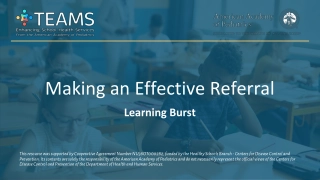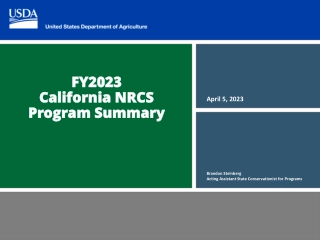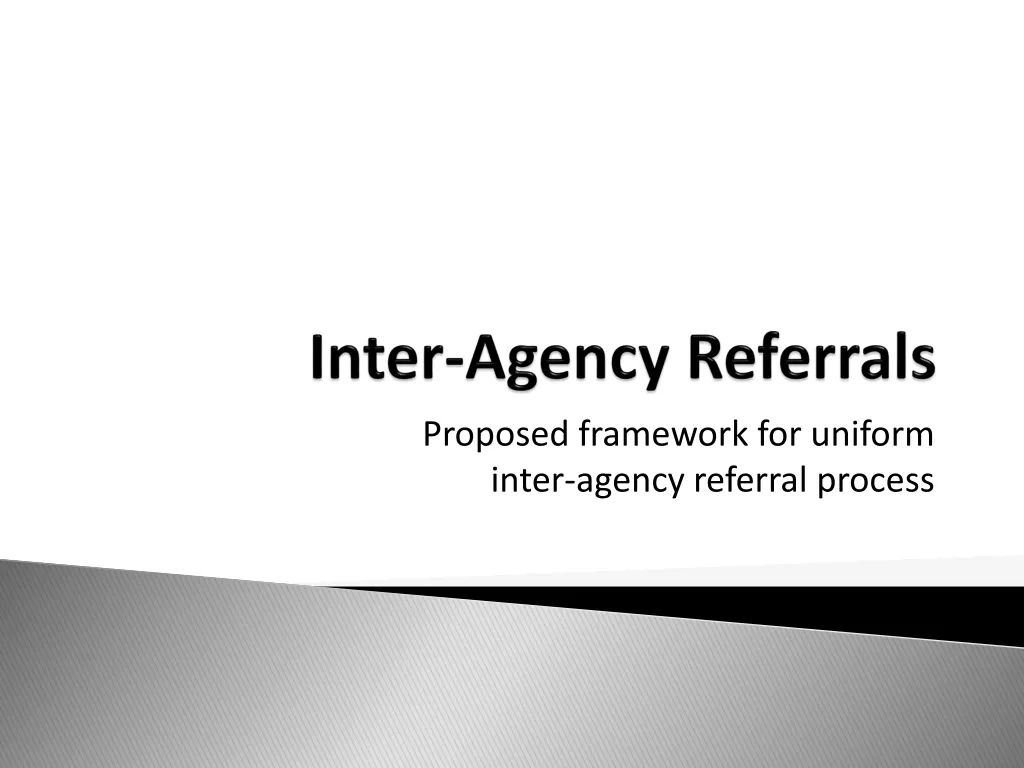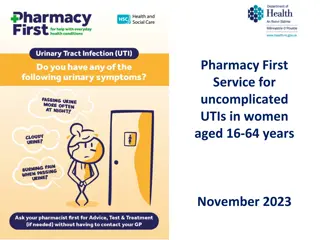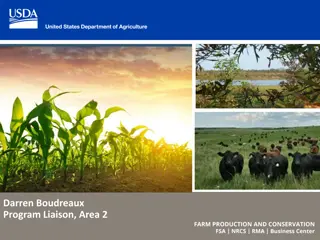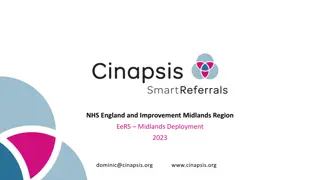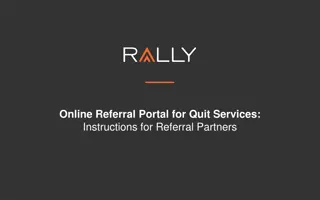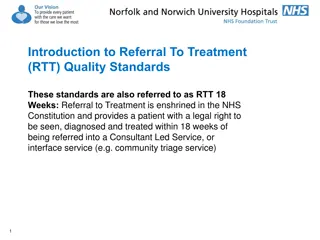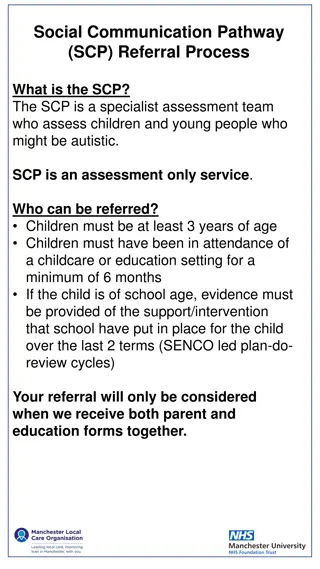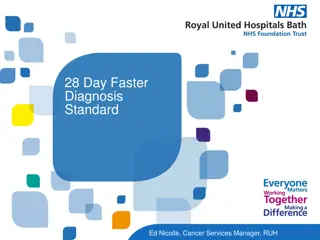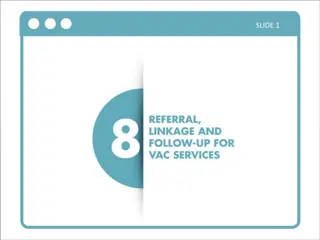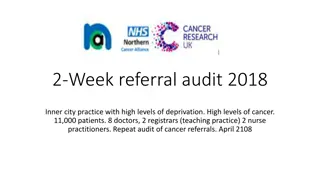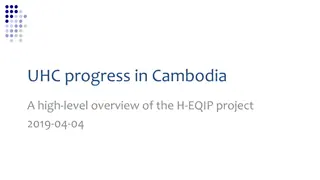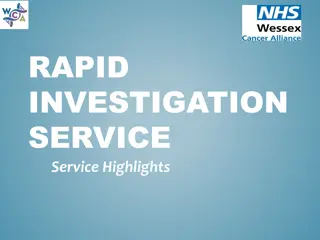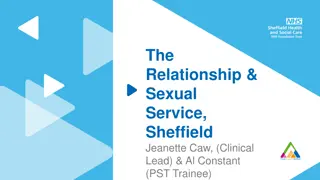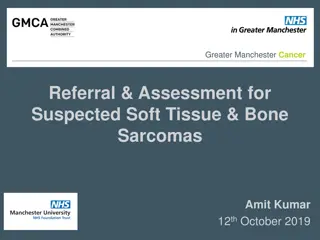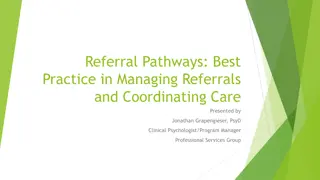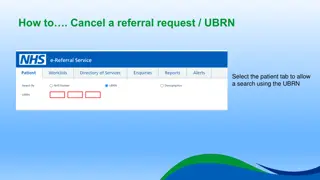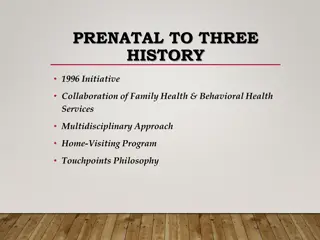
Quality Improvement Programme for Epilepsy Referral Wait Times
"Join the RCPCH Epilepsy Quality Improvement Programme to streamline referral pathways and reduce waiting times for new seizure appointments, aiming for a 50% improvement within six months. Learn about the project team's initiatives and the impact on patient care. Discover the focus on patient journey mapping and stakeholder engagement for enhanced service provision."
Download Presentation

Please find below an Image/Link to download the presentation.
The content on the website is provided AS IS for your information and personal use only. It may not be sold, licensed, or shared on other websites without obtaining consent from the author. If you encounter any issues during the download, it is possible that the publisher has removed the file from their server.
You are allowed to download the files provided on this website for personal or commercial use, subject to the condition that they are used lawfully. All files are the property of their respective owners.
The content on the website is provided AS IS for your information and personal use only. It may not be sold, licensed, or shared on other websites without obtaining consent from the author.
E N D
Presentation Transcript
RCPCH Epilepsy Quality Improvement Programme August 2021 April 2022 Time since first referral to first paediatric assessments North Tees & Hartlepool NHS Foundation Trust RCPCH Epilepsy Quality Improvement Programme project team: Dr Beena Kurup, Consultant Paediatrician Dr P Siva Kumar, Consultant Paediatrician, Lead Epilepsy Service Dr A Koshy, Consultant Paediatrician Pauline King, Epilepsy Specialist Nurse Katie Bailey, Epilepsy Specialist Nurse National audit results included within this case study acts as a guide only to performance standards. The service improvements made during the EQIP cannot be entirely attributed to the reported results in the Epilepsy12.
Time since first referral to first paediatric assessments North Tees & Hartlepool NHS Foundation Trust Project aim To reduce waiting times for new seizure referrals by a paediatrician with expertise in epilepsy from 16 weeks to 4 weeks in 50% of referrals within 6 months of the project start by the end of March 2022. Background According to Epilepsy12 data, 31% of their patients were waiting more than 16 weeks for their first seizure appointment with a paediatrician with expertise in epilepsy. The majority of referrals were from GPs and outpatient departments, which is an unusual proportion compared to other services in the country and required detailed analysis. Area of focus To focus on new referrals and improve the time from the first seizure to the first appointment. The team plans to map the patient referral pathways and implement what they have learned from the RCPCH Equality Quality Improvement Programme to begin making the required changes in service provision.
Time since first referral to first paediatric assessments North Tees & Hartlepool NHS Foundation Trust Driver diagram Change ideas Secondary Drivers Primary Drivers 1. Map Patient journey following referrals ( GP, Ward, A&E, OPD). 2. Identify problem areas for delays 3. Brainstorm for solutions. 4. Identify Stakeholders 5. Streamline referral pathways. Have one point of referral for GP and internal referrals. 6. Test the process and identify if improving and implement change. 7. Patient & family engagement, incorporate feedback into solutions. 8. Dissemination of information/change within the department and wider settings 9. Audit of the process & Pathways regarding time frame seen and make changes. 10. Achieve 50% of this by March 2022 - Streamline referral process Review existing process Improving access to Epilepsy services & thereby Patient Experience. Ensuring patients are seen timely by reducing current waiting time of 16 weeks. To see 50 % of referrals in 4 weeks by March 2022 Create SOP/ guidelines/policies; Disseminate information Ensure Clear pathway Improve patient experience - Ensure parent patient participation and incorporate their views into changes
Time since first referral to first paediatric assessments North Tees & Hartlepool NHS Foundation Trust Changes After joining the EQIP, the team recognised their aim to reduce referral waiting times in line with NICE recommendations of 2 weeks was not achievable within the programme period; therefore, the objective changed to reduce waiting times to 4 weeks in 50% of referrals. As an initial step, it was agreed to standardise templates for clinics for uniformity purposes. Researched from neighbouring Trusts, the different types of epilepsy clinic templates that include a standard time frame for new patient clinic appointment time and similarly for the reviews. Each Trust had different types of templates that ranged from 1 hour appointment times for a new patient to 30 minutes. The team agreed to standardise their template with three new patient slots (45 minutes each) and five review slots with 20 minute slots (total clinic time: 4 hours). Arrangements were made with the appointment booking office to leave a single new patient slot per epilepsy clinic for up to 48 hours so that any urgent referrals can be booked into the clinics at short notice. If no new patients are booked in less than 48 hours, the booking office can use the slots to book review patients. This meant that between the three consultants, there would be a maximum of three new patient slots free to book referrals. Revised the current pathway for referral to epilepsy clinics for patients admitted to the ward from A&E, which is now processed by the booking office, and patients are offered the next available new patient slot.
Time since first referral to first paediatric assessments North Tees & Hartlepool NHS Foundation Trust Changes Created a Standard Operating Procedure for A&E referrals of afebrile seizure patients to be seen in seizure clinics, and this is now functional. Developed a service improvement proposal for leaving one new patient appointment free to ensure patients are seen urgently.
Time since first referral to first paediatric assessments North Tees & Hartlepool NHS Foundation Trust Results Established a single referral pathway. Allocating referrals to the next available space rather than to the same consultant. Implemented a single process of appointment allocation by standardising templates for clinics to have uniformity and streamlining GP referrals. The team managed to work on resolving the issues, which has led to an increase in one or two additional new patients. Experienced changes in reduced waiting times for new patients referred via the GP. Measured and reviewed progress weekly, which revealed for the first time that they had achieved their aim of reducing waiting times from 16 to 4 weeks for 50% of patients. A patient was added to a new patient appointment from a referral completed on 23/10/21. This meant the patient was seen in 3 weeks; however, it was seen as an extra, which is not ideal. Conducted a brief audit on whether the changes were made and had an impact on reducing the delay in seeing patients.
Time since first referral to first paediatric assessments North Tees & Hartlepool NHS Foundation Trust Results Increased patient and parent engagement, which helped to understand the issues experienced when requesting their feedback on required improvements from a different perspective. Selected four patients to provide feedback on the changes made: Patient A (7 weeks) Quite happy with the way it was turned around." o Patient B (4 weeks) Experience was really good. Wait, okay. Consultant was excellent. o Patient C (4 weeks) Quite alright as it gave us time to digest what had happened. Any sooner would have o been too much information. Patient D (4 weeks) Very impressed with the waiting time; I thought it would be much longer. We already o have the next appointment too. Incorporated sustainable improvement by implementing a review process for all clinic appointment allocation compliance 48 hours before each clinic.
Time since first referral to first paediatric assessments North Tees & Hartlepool NHS Foundation Trust Change implemented Time referrals seen 15 T im e fro m R e fe rra l to F irs t C lin ic V is it (w e e k s ) The team reviewed the month prior to the implementation of the change (August) to get a baseline of where they were in 10 terms of NICE guidelines. The review showed that the average waiting time was 12 weeks before the first 5 appointment. 0 August S e pte mbe r O ctobe r N ov e mbe rD e ce mbe r M onth
Time since first referral to first paediatric assessments North Tees & Hartlepool NHS Foundation Trust Time in weeks from referral to first appointment Average time in weeks to first appointment 15 August 12 10 9 September 6 5 4 4 October 0 November AUGUST SEPTEMBER OCTOBER NOVEMBER DECEMBER Month referral was made December The team collected data from two random new patients seen in two of the consultant clinics for the months following, up until December. The waiting time of each patient was compared and then calculated against the average waiting time for that month.
Audit results cohort 3/4 professional input North Tees & Hartlepool NHS Foundation Trust NICE recommends that CYP presenting with suspected seizure are seen by a specialist in the diagnosis and management of epilepsies within 2 weeks of presentation (Quality statement 1). The percentage of CYP with input from a paediatrician with expertise in the first year of care in 2021 was 88% in 2021, above regional and national averages, and 63% in 2022. 2019 2020 2021 2022 Percentage of CYP with input from: 2021 PENNEC 2021 England & Wales 2022 PENNEC 2022 England & Wales - 81% 85% 63% 81% 88% 88% 91% Paediatrician with expertise OR paediatric neurologist (PI.1) Paediatrician with expertise - 90% 88% 63% 77% 85% 85% 89% Paediatric neurologist - 12% 24% 16% 27% 25% 19% 20% Epilepsy specialist nurse - 88% 82% 63% 64% 80% 75% 80%
Audit results cohort 3/4 time since first referral North Tees & Hartlepool NHS Foundation Trust The percentage of CYP diagnosed with epilepsy who were seen by a paediatrician with expertise in epilepsy within 2 weeks in 2021 was 21%. In 2022 this percentage reduced to 5%. The percentage of CYP diagnosed with epilepsy who were seen by a paediatrician with expertise in epilepsy at 16+ weeks decreased in 2021 to 24% and continued to reduce to 16% in 2022. Time since first referral to first paediatric assessment 2019 2020 2021 2022 2021 PENNEC 2021 England & Wales 2022 PENNEC 2022 England & Wales 0-2 weeks - 10% 21% 5% 22% 23% 20% 21% 2-4 weeks - 7% 9% 0% 10% 12% 11% 11% 4-6 weeks - 12% 9% 0% 8% 9% 9% 11% 6-8 weeks - 2% 6% 11% 5% 7% 6% 8% 8-10 weeks - 7% 0% 16% 2% 5% 7% 7% 10-12 weeks - 7% 12% 5% 4% 3% 4% 5% 12-14 weeks - 5% 3% 11% 2% 3% 4% 3% 14-16 weeks - 2% 3% 0% 1% 2% 1% 2% 16+ weeks - 31% 24% 16% 15% 13% 16% 1%
Audit results cohort 3/4 time since first referral North Tees & Hartlepool NHS Foundation Trust Time since first referral to first paediatric assessment Graph showing time since first referral to first 100% paediatric assessment between the years 2020 80% and 2022. >16 weeks 60% 12-16 weeks 8-12 weeks 40% 4-8 weeks 20% 0-4 weeks 0% 2020 2021 2022
Audit results cohort 3/4 time since first referral North Tees & Hartlepool NHS Foundation Trust The percentage of CYP waiting less than 4 weeks from first referral to first paediatric assessment has decreased since 2021. RVW represents Trust-level results for North Tees & Hartlepool NHS Trust. Time since referral to first paediatric assessment in 2022 35% 30% 25% 20% 15% 10% 5% 0% RVW PENNEC England & Wales 0-4 weeks 4-8 weeks 8-12 weeks 12-16 weeks >16 weeks
Time since first referral to first paediatric assessments North Tees & Hartlepool NHS Foundation Trust Challenges The engagement with the booking office regarding updating vetting procedures for referrals that require written approval of suggested changes for booking into new patient slots with any consultant was resolved. The team identified that many referrals were addressed to named consultants, which resulted in some receiving a lot more referrals than others. This is because the GPs are aware of the consultants who have been in the post longer than others. This meant that for those consultant clinics, they had no new patient slots for several weeks due to slots being filled with referrals, resulting in 12-16 week wait times compared to other consultants, who had clinic slots with 3-4 week wait times. Created awareness amongst colleagues by presenting their EQIP project to the Trust Directorate meeting to express the importance of help from management and the benefits of support from a Quality Improvement Project Manager. Unfortunately, although management was in agreement, the team was not given any additional dedicated time to work on the project, despite the assured support. It was identified that new patient slots were often booked for review patients, which meant that new patient appointments were given several weeks down the line.
Time since first referral to first paediatric assessments North Tees & Hartlepool NHS Foundation Trust Outcomes Mapped new referral pathways to successfully identify gaps and inconsistencies in the process for first seizure patients. Measured and reviewed progress weekly, which revealed for the first time that they achieved their aim of reducing waiting times from 16 to 4 weeks for 50% of patients during the participation of the EQIP. Tested and established a new single referral pathway from GP, A&E, and inpatient wards. Tested and approved the new standardisation of appointment time allocations for new and review patients. Experienced changes in reduced waiting times for new patients referred via the GP. Increased engagement with patients and families helped the team learn about issues experienced from their perspective. Patient engagement based on their experience of wait times informed the team they: Were generally positive. o Were happy with telephone communication. o Experienced information overload if an appointment is received in 2 weeks. o Internal referrals: were happy to wait if contact numbers are provided. o Referrals from GPs: expressed anxiety about the wait. o
Time since first referral to first paediatric assessments North Tees & Hartlepool NHS Foundation Trust Outcomes National audit outcomes showed the percentage of CYP with input from a paediatrician with expertise in the first year of care in 2021 was 88%, above regional and national averages. In 2022 this figure was 63%. The percentage of CYP diagnosed with epilepsy that were seen by a paediatrician with expertise in epilepsy within 2 weeks in 2021 was 21%. In 2022, this percentage reduced to 5%. The percentage of CYP diagnosed with epilepsy that were seen by a paediatrician with expertise in epilepsy at 16+ weeks decreased in 2021 to 24% and continued to reduce to 16% in 2022.
Time since first referral to first paediatric assessments North Tees & Hartlepool NHS Foundation Trust Lessons learnt Constancy of purpose is key. Continuously engaging with all parts of the service and each element of the process is fundamental. Patient and family engagement and feedback helped drive the changes required. Communicating any new changes to all parts of the system is essential to ensuring sustained improvement in sharing best practices and internal practices. Formal use of QI tools, such as mapping the patient s journey, helped to identify gaps, drive change, and measure progress. Direct contact with parents and families was a fast way to gather feedback regarding their experience of the process and the changes made. An important aspect of any improvement plan is to identify how they can improve patient participation and engagement and incorporate patient views into future improvement projects. Visual presentation of team project intervention Team poster Team video presentation
https://eqip.rcpch.ac.uk eqip@rcpch.ac.uk @RCPCHEQIP

